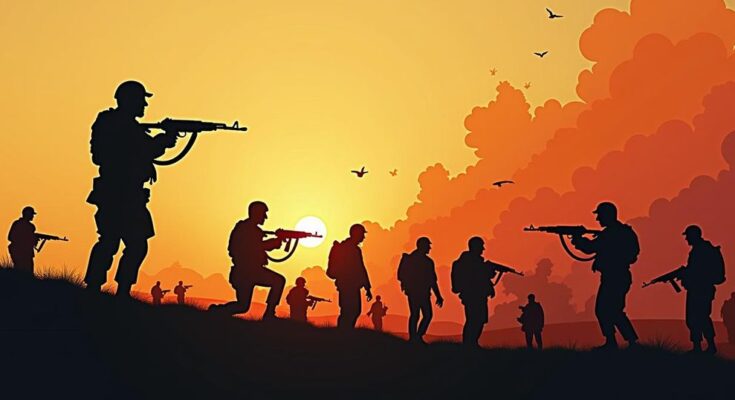The assassination of Hezbollah leader Hassan Nasrallah has significantly escalated tensions in the Middle East, raising critical questions about the responses of Hezbollah, Iran, and Israel. Hezbollah is likely to demand revenge and utilize its remaining military assets, potentially provoking a devastating Israeli counter-response. Iran may engage its allied militias to retaliate, while Israel intends to continue military offensives without pause. The overall situation remains precarious and could lead to broader conflict.
The recent assassination of Hassan Nasrallah, the leader of Hezbollah, marks a significant escalation in the ongoing conflict between Israel and the Lebanese militant group. This incident not only heightens tensions within the region, but it also risks drawing in further involvement from Iran and the United States, suggesting a potential for more extensive conflict. The trajectory of the situation hinges on three pivotal questions concerning the responses of Hezbollah, Iran, and Israel. Hezbollah is currently grappling with severe setbacks; its leadership has suffered significant losses, including the deaths of many high-ranking commanders, coupled with the destruction of critical communication channels and weaponry from airstrikes. Despite these challenges, Hezbollah remains committed to resisting Israeli actions. Analysts predict that the assassination of Nasrallah will destabilize the group temporarily, compelling it to demand revenge. The organization still boasts a considerable number of fighters and a notable stockpile of long-range, precision-guided missiles, which could potentially target Israeli cities such as Tel Aviv. The internal pressure to act against Israel could lead to aggressive retaliation, but such actions would likely provoke an overwhelming Israeli counter-response that may extend to devastating repercussions for Lebanon and even Iran. Iran, for its part, views Nasrallah’s murder as a significant blow and has instituted a mourning period for the leader while enhancing security measures for its own leaders, including Ayatollah Ali Khamenei. In response to this provocation, Iranian hardliners may advocate for retaliation through the activation of allied militias across the region. This coalition, known as the “Axis of Resistance,” consists of various armed factions that could engage in heightened confrontations against Israeli and US interests in the Middle East. However, any potential retaliatory measures by Iran will likely be carefully calibrated to avoid sparking a full-scale war, which would be difficult for Iran to sustain. Israel, having clearly articulated its intent to continue military actions, appears undeterred by calls for a ceasefire. The Israeli Defense Forces (IDF) assess that Hezbollah is vulnerable and plans to intensify offensive operations until the threat posed by Hezbollah is effectively neutralized. While ground troop deployment appears necessary for a comprehensive strategy, past experiences in conflict zones like Gaza suggest that military incursions could lead to prolonged entanglements. In his last address, Nasrallah indicated that an Israeli ground invasion would present a “historic opportunity” for his factions to counteract. In conclusion, the assassination of Hassan Nasrallah has served as a catalyst for a complex and potentially escalatory situation involving Israel, Hezbollah, and Iran. Each actor is poised to respond in accordance with its strategic interests, leading to a volatile atmosphere that could detrimentally affect the region’s stability. Hezbollah faces internal pressures to retaliate against Israel, Iran is likely contemplating potential responses through allied militias, and Israel seems intent on continuing its military operations. The ensuing actions from all parties will be critical in shaping the future landscape of conflict in the region.
The conflict between Hezbollah and Israel has been marked by long-standing animosities and intermittent violence. Hezbollah is recognized as a militant Islamist group with significant military capabilities, heavily supported by Iran, which provides both funding and military support. The region has been further complicated by the involvement of various international actors, including the United States, leading to a highly volatile situation that possesses the potential for broader conflict. The assassination of a prominent leader, such as Hassan Nasrallah, often serves as a tipping point, prompting unpredictable escalations and reactions within the wider geopolitical landscape.
The implications following the assassination of Hassan Nasrallah are profound, with potential ramifications that may unfurl over various fronts. The responses of Hezbollah will be critical to understanding the immediate future of the conflict, while Iran’s strategic choices will play a major role in either escalation or restraint. Israel’s continued military engagement underscores its commitment to neutralizing threats from Hezbollah, but the complexities of ground warfare and its consequences remain an ever-present risk. Each action undertaken by these entities will be crucial in determining the trajectory of their engagements and the stability of the regional geopolitical climate.
Original Source: www.bbc.com



